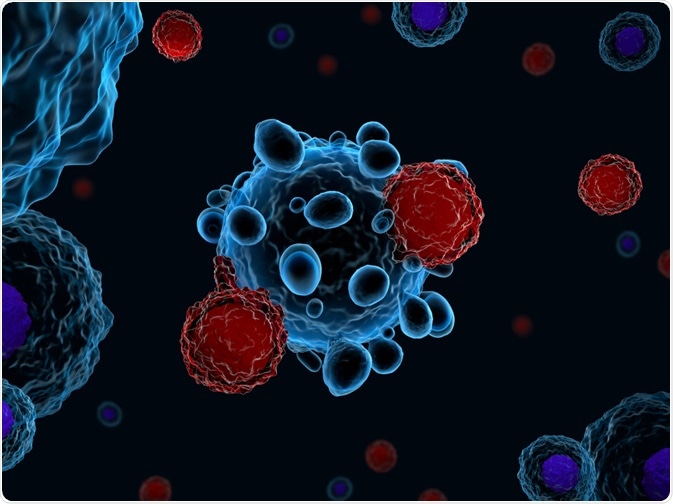Adoptive T cell therapy is a promising type of immunological treatment that utilizes the immune system to fight diseases such as cancer. The method works by infusing tumor-specific cytotoxic T cells into patients that target and attack cancer cells. Trials employing tumor-infiltrating lymphocytes in adoptive T cell therapy have proven successful in treating metastatic melanoma.
 Image Credit: Meletios Verras/Shutterstock.com
Image Credit: Meletios Verras/Shutterstock.com
Specifically, engineered CAR T cells are currently being used to treat hematologic malignancies. The combination of cancer vaccines and adoptive T cell therapy may also provide new treatment options for cancer patients.
Autologous tumor-infiltrating lymphocytes (TIL) and metastatic melanoma
Adoptive T cell therapy through tumor-infiltrating lymphocytes (TIL) involves the extraction of TILs from the tumor before being cultured with interleukins to form therapeutic TILs. The cultured tumor-infiltrating lymphocytes are then infused back into the patient to re-infiltrate the tumor and lyse cancer cells.
Adoptive T cell therapy through TILs has shown success in treating metastatic melanoma with over 50% clinical responses and treatment durability lasting years. The successful treatment of melanoma brain metastases with adoptive cell therapy indicates that TILs are able to cross the blood-brain barrier. This provides the potential for developing future therapy for brain tumors.
The expanded utilization of adoptive cell therapy through TILs is dependent on the identification of antigen-specific T cells in other cancers. The treatment also requires the surgical excision of the tumor metastasis where TILs are found, meaning some advanced melanoma patients will not be candidates for this type of therapy.
CAR T cells and hematologic malignancies
CAR T cells are also used in adoptive T cell therapy to treat hematologic malignancies. The treatment involves the engineering of chimeric antigen receptors (CAR) for the redirection of T cells to target and attack cancer cells.
T cells are collected from the blood of a patient or donor before being genetically engineered to produce the surface receptors that bind to specific antigens. The CAR T cells are multiplied before being infused back into the body. The method has been successful in targeting CD19, a surface antigen expressed on precursor and mature B cells.
CAR T cell therapy has been successful in clinical trials for treating B cell malignancies such as chronic lymphocytic leukemia and non-Hodgkin lymphoma. The FDA approved two CAR T cell therapies for the treatment of acute lymphoblastic leukemia in children and adult advanced lymphomas in 2017. CAR T cells have also been successfully utilized in salvage therapy for multiple myeloma patients who had received previous treatment that was unresponsive.
CAR T cells have been found to be less successful in treating solid tumors partly because of the tumor immunosuppressive environment. Current studies are attempting to enhance CAR T cell therapy and improve success rates in solid tumors by combining CAR T cells with other effector molecules
CAR T-Cell Therapy: How Does It Work?
Adoptive T cell therapy and cancer vaccines
T cells can also be removed from the blood of a patient that has received a cancer vaccine. HER2/neu is a tumor-associated antigen that is overexpressed in 10-40% of breast cancers as well as ovarian, renal and gastric carcinomas. Patients provided with an HER-2/neu peptide–based vaccine were then given adoptive T cell therapy.
The primed T cells after the vaccine were extracted from peripheral blood and cultured ex vivo.
The study found that tumor-specific T cells could be efficiently expanded from blood following vaccine priming. Further clinical trials have shown that adoptive T cell therapy after a HER-2/neu peptide–based vaccine has resulted in statistically greater tumor antigen specific immunity than can be accomplished through immunization alone.
The results also indicate that the method may be effective in producing tumor-specific polyclonal T cells for therapeutic use that can be applied to any tumor type.
References
- Zang, Y-W. et al. 2014. Clinical application of adoptive T cell therapy in solid tumors, Medical Science Monitor, 20, pp. 953-959. https://www.ncbi.nlm.nih.gov/pmc/articles/PMC4063985/
- Wu, R. et al. 2012. Adoptive T-cell Therapy Using Autologous Tumor-infiltrating Lymphocytes for Metastatic Melanoma: Current Status and Future Outlook, Cancer Journal, 18, pp. 160-175. https://www.ncbi.nlm.nih.gov/pmc/articles/PMC3315690/#R63
- National Cancer Institute: CAR T Cells: Engineering Patients’ Immune Cells to Treat Their Cancers https://www.cancer.gov/about-cancer/treatment/research/car-t-cells
- Ghosh, A. et al. 2017. CAR T cell therapy for multiple myeloma: where are we now and where are we headed? Leukemia & Lymphoma, 6, pp. 1-12. https://www.ncbi.nlm.nih.gov/pubmed/29105517
- Dang, Y. et al. 2007. Tumor Antigen–Specific T-Cell Expansion Is Greatly Facilitated by In vivo Priming, Clinical Cancer Research, 13, pp. 1883-1891. https://www.ncbi.nlm.nih.gov/pubmed/17363545
Further Reading
Last Updated: May 10, 2021